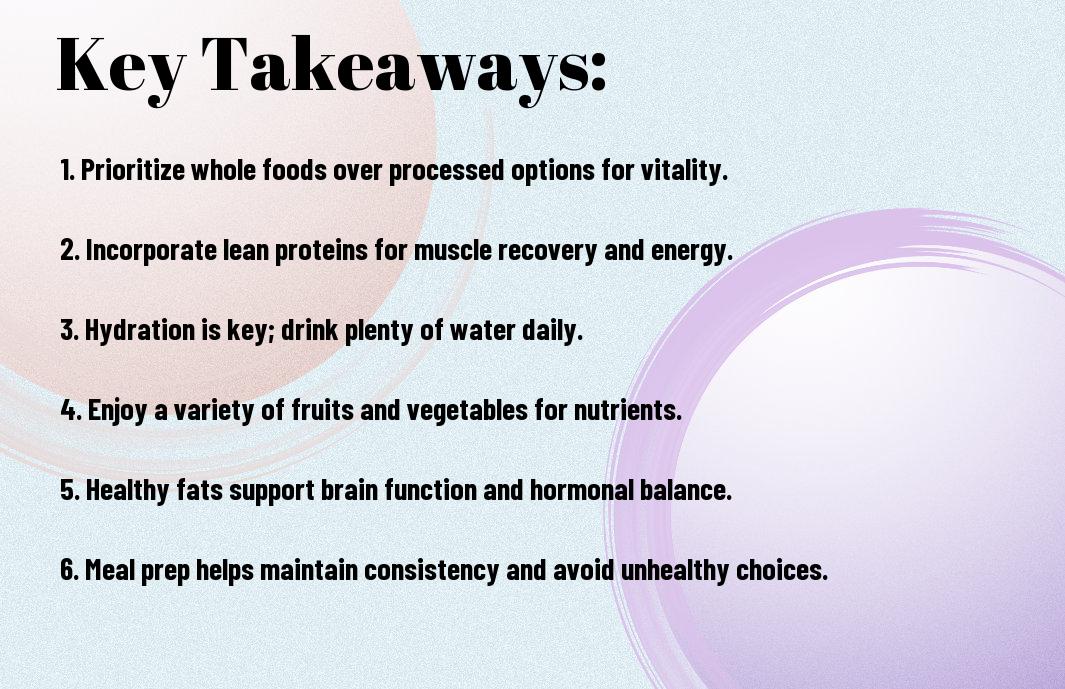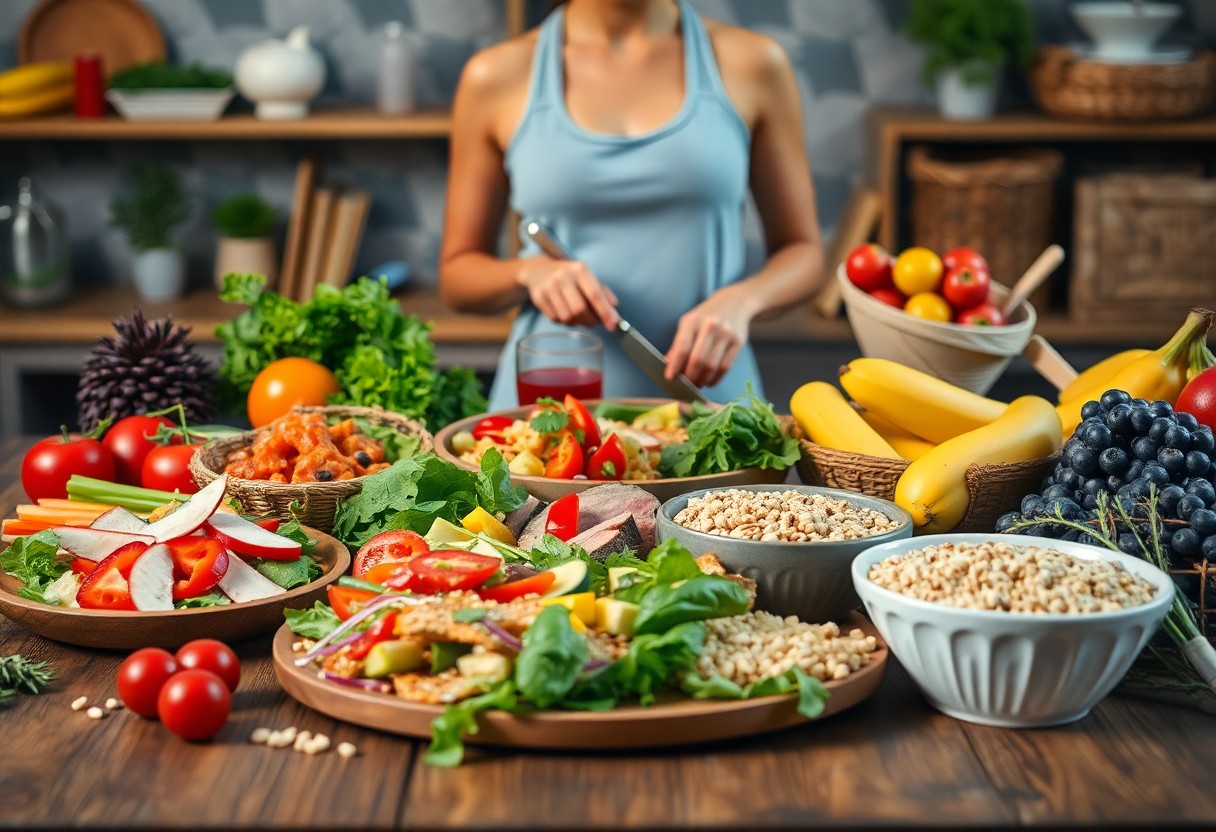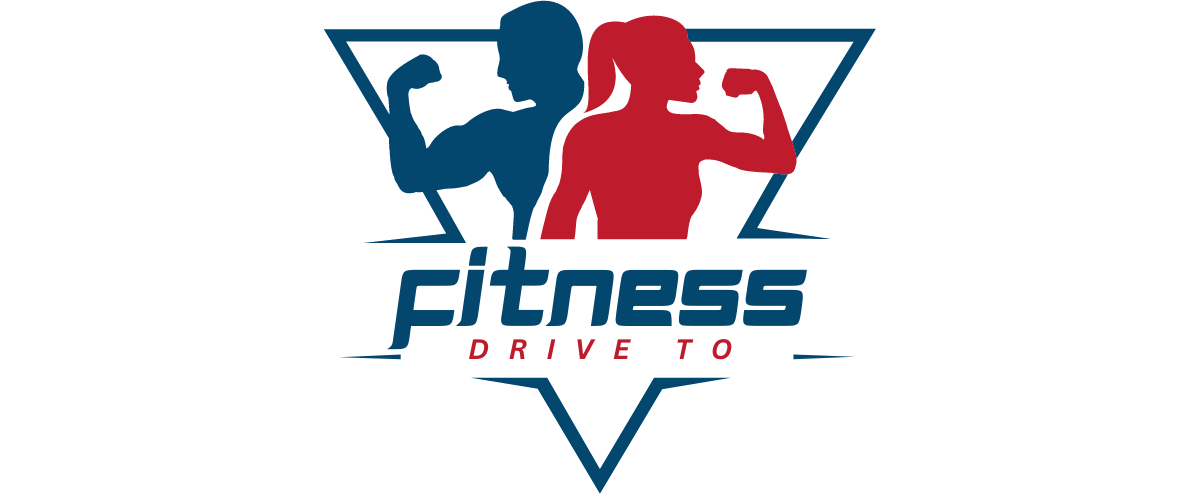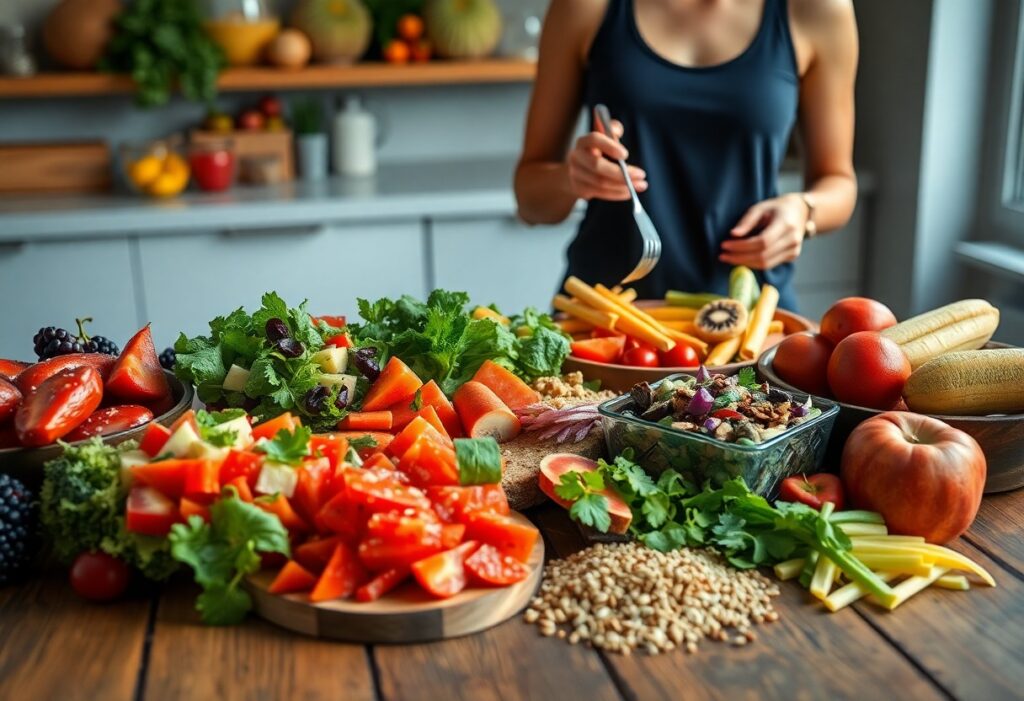You have the power to transform your health and energy levels by adopting the nutrition secrets of fit women. These women prioritize whole foods, balance their macronutrients, and stay hydrated, ensuring they fuel their bodies effectively for both workouts and daily life. By understanding what healthy choices they make, you can incorporate similar habits into your routine. Whether it’s opting for nutrient-rich snacks or discovering the benefits of meal prepping, you’ll learn how to eat smart and stay energized every day. Dive in and unlock the secrets to vibrant health!
Key Takeaways:
- Balanced Diet: Fit women prioritize a varied diet that includes a balance of macronutrients such as proteins, carbohydrates, and healthy fats.
- Whole Foods: Emphasis on consuming whole, unprocessed foods like fruits, vegetables, lean proteins, and whole grains for optimal nutrition.
- Portion Control: Many fit women practice mindful eating and portion control to manage calorie intake without compromising nutrition.
- Stay Hydrated: Drinking plenty of water is a common habit, as it plays a vital role in energy levels and overall health.
- Protein Intake: Adequate protein consumption is crucial for muscle recovery and satiety, often incorporated into meals and snacks.


The Foundation of a Balanced Diet
While building a robust diet, it’s important to focus on the right balance of food groups. A diet that provides a variety of nutrients ensures you have the energy and stamina needed for your active lifestyle. This balance not only caters to your body’s needs but also helps in maintaining your overall health. Prioritizing whole foods over processed ones can significantly enhance your nutrition, allowing you to thrive in your daily activities.
Essential Nutrients
Among the key players in your diet are vitamins, minerals, proteins, fats, and carbohydrates. These important nutrients work synergistically to support your immune system, boost energy levels, and promote optimal functioning of your body. By incorporating diverse foods from each category, you sustain not only your physical health but also your mental well-being.
Macronutrient Ratios
By paying attention to your macronutrient ratios, you can tailor your diet to meet your specific fitness goals. Understanding the balance between proteins, carbohydrates, and fats is vital in supporting your body’s functions and ensuring sufficient energy for your activities.
At the heart of your nutritional strategy lies macronutrient ratios, which can vary based on your personal goals, whether it’s muscle gain, weight loss, or maintenance. Typically, a balanced approach includes approximately 20-30% protein, 45-65% carbohydrates, and 20-35% healthy fats. Adjusting these ratios can significantly impact your energy levels and muscle recovery. Working with a nutritionist can help you find the perfect balance tailored to your specific lifestyle and fitness objectives, leading to better results and improved overall health.
The Importance of Hydration
The significance of hydration cannot be understated when it comes to maintaining your energy levels and overall health. Staying properly hydrated helps with digestion, nutrient absorption, and even mood stability. As a fit woman, prioritizing hydration enables you to perform at your best, whether you’re exercising or simply going about your daily activities. You should be mindful of your fluid intake throughout the day to keep your body functioning optimally.
Daily Water Intake
Across various guidelines, it is suggested that women aim for at least 2.7 liters (91 ounces) of total water intake daily, which includes all beverages and food. However, your individual needs may vary based on factors such as activity level, body size, and climate. Pay attention to your body’s signals, and make adjustments accordingly to ensure you stay well-hydrated.
Benefits of Hydrating Foods
Before you overlook the role of food in your hydration strategy, consider that many fruits and vegetables have high water content that contributes to your daily intake. Foods like watermelon, cucumbers, and oranges not only hydrate you but also provide necessary nutrients. Incorporating these hydrating foods into your meals can significantly enhance your hydration efforts.
Due to their high water content, hydrating foods not only quench your thirst but also offer additional vitamins and minerals, which can further boost your health. For example, consuming a variety of fruits and vegetables helps enhance your electrolyte balance, supporting muscle function and recovery. Incorporating these foods into your diet can also aid in digestion and promote feelings of satiation, thereby preventing overeating. Make hydrating foods a staple in your nutrition for a well-rounded, energized lifestyle.
Meal Timing and Frequency
Once again, the timing of your meals plays a significant role in your overall health and energy levels. Fit women often prioritize regular meal intervals, consuming food every 3 to 5 hours to maintain stable blood sugar levels and prevent energy crashes. This strategy helps you stay focused, energized, and less prone to unhealthy snacking. By organizing your meals and snacks, you can effectively fuel your body throughout the day and support optimal performance in both daily activities and workouts.
Optimizing Metabolism
Among the top benefits of frequent meals is the ability to boost your metabolism. Eating smaller, balanced meals throughout the day encourages your body to efficiently process nutrients and burn calories more effectively. This approach can assist you in managing your weight and enhancing your overall metabolism, empowering you to feel stronger and more vibrant in your fitness journey.
Pre and Post-Workout Nutrition
Behind every fit woman’s successful workout regime lies a well-thought-out approach to pre and post-workout nutrition. Ensuring you consume the right nutrients before and after exercise can significantly impact your performance and recovery.
Consequently, focusing on both pre and post-workout nutrition is fundamental to your fitness success. Prior to exercising, aim for a meal or snack rich in carbohydrates and moderate in protein to fuel your performance, while keeping it low in fat to promote quick digestion. Following your workout, prioritize consuming protein and carbohydrates within 30 minutes to support muscle recovery and replenish glycogen stores. This balanced approach will help you feel more energized, enhance your recovery, and optimize your results as you strive for your fitness goals.
Smart Snacking Strategies
Unlike many individuals who rely on processed foods, fit women prioritize smart snacking to maintain their energy levels while supporting overall health. They choose nutrient-dense options that provide lasting satisfaction and fuel for their active lifestyles. This approach allows you to curb hunger without sabotaging your wellness goals, making snacking a key component of your healthy routine.
Healthy Snack Options
Smart snacking can transform your energy levels and improve your well-being. Opt for whole foods like fruits, vegetables, and nuts, which deliver vital vitamins and minerals. Additionally, consider low-fat dairy products or whole grain snacks that offer fiber and protein to keep you feeling full. These nutritious choices not only satisfy cravings but also boost your energy and health.
Portion Control Tips
With effective portion control, you can enjoy your favorite snacks without overindulging. Focus on measuring servings and using smaller plates to help manage your intake. Additionally, being mindful when snacking and avoiding distractions like screens can help you savor each bite. This practice encourages a healthier relationship with food and maintains your energy levels throughout the day.
It’s vital to adopt portion control techniques that allow you to enjoy nutritious snacks without overdoing it. Consider these strategies:
- Pre-portion snacks in small containers
- Use measuring tools for accuracy
- Limit eating straight from the package
- Opt for single-serving packs
- Be mindful of portions at social events
This mindful approach to your snacking habits not only supports your fitness goals but also fosters a healthier lifestyle overall.

The Role of Superfoods
All health-conscious women understand the significant role that superfoods play in enhancing their overall well-being. These nutrient-dense foods provide a plethora of vitamins, minerals, and antioxidants, which support your body’s functions, boost your energy levels, and facilitate recovery. Integrating superfoods into your diet can elevate your fitness game, leading to a healthier and more energized lifestyle.
What Are Superfoods?
Before you explore the world of superfoods, it’s imperative to know what they are. Superfoods refer to nutrient-rich foods that offer maximum health benefits. These foods are typically high in antioxidants, vitamins, and minerals while being low in calories. Incorporating a variety of superfoods into your diet can help you achieve optimal health and energy.
Top Superfoods for Energy
Above all, certain superfoods are especially effective at boosting your energy levels. Foods like kale, quinoa, chia seeds, and berries are well-known for their ability to sustain energy and enhance endurance. By making these superfoods a staple in your meals, you can power through your day without feeling fatigued.
Hence, including kale and quinoa can provide you with ample fiber and protein, promoting steady energy release. Chia seeds are excellent for hydration and keep you feeling full longer due to their omega-3 fatty acids. Incorporating colorful berries into your snacks not only adds flavor but also packs in antioxidants that combat oxidative stress. By prioritizing these superfoods, you can enjoy a remarkable boost in your daily energy levels and overall vitality.
Meal Prep and Planning
Many fit women swear by meal prep and planning as a key component of their nutrition strategy. By organizing meals ahead of time, you can ensure that you have healthy options readily available, making it easier to resist unhealthy choices during busy days. This proactive approach not only saves time but also helps you manage portion sizes and ingredients effectively, fostering a balanced diet that supports your fitness goals.
Strategies for Success
At the core of successful meal prep are a few strategic practices. Begin by setting aside a specific day each week dedicated to prepping your meals. Choose recipes that share ingredients to minimize waste, and try batch cooking staple items like grains, proteins, and roasted vegetables. Keep your refrigerator organized, and invest in quality containers to streamline your effort, making it easier to find what you need when hunger strikes.
Quick and Healthy Recipe Ideas
Meal prepping doesn’t have to be tedious—quick and healthy recipes can make it enjoyable.
Further, you can prepare simple dishes like grilled chicken and quinoa bowls, stir-fried veggies with tofu, or overnight oats with fruits that are both nutritious and easy to throw together. Incorporating a variety of spices and sauces can enhance flavors, so don’t hesitate to experiment! Focus on whole foods rich in vitamins, minerals, and protein to keep you energized throughout the week. Prioritizing quick and healthy options will ensure you stay on track with your nutritional goals effortlessly.
Conclusion
Presently, understanding the nutrition secrets of fit women can empower you to make informed dietary choices that support your health and energy levels. By incorporating a balanced mix of whole foods, lean proteins, healthy fats, and plenty of fruits and vegetables into your meals, you can fuel your body effectively. Additionally, staying hydrated and listening to your body’s hunger cues will help you maintain a sustainable and enjoyable eating pattern. Embracing these principles can enhance your overall wellness and vitality, helping you to feel your best every day.
Q: What types of foods do fit women typically include in their diets?
A: Fit women often focus on a varied diet that includes whole foods such as lean proteins (chicken, fish, legumes), whole grains (brown rice, quinoa, oats), plenty of fruits and vegetables, healthy fats (avocado, nuts, olive oil), and dairy or plant-based alternatives. The emphasis is on nutrient-dense foods that provide energy and support overall health.
Q: How important is meal timing for fit women?
A: Meal timing can play a significant role in maintaining energy levels and optimizing performance. Many fit women choose to eat smaller, more frequent meals throughout the day to sustain energy and prevent hunger. Consuming a meal or snack containing protein and carbohydrates before and after workouts is also common practice to aid muscle recovery and enhance energy.
Q: Do fit women follow strict diets or allow for flexibility in their eating habits?
A: While some fit women may adhere to specific dietary plans, many maintain flexibility in their eating habits. This balance allows them to enjoy a variety of foods, including occasional treats, while still prioritizing their overall health and fitness goals. The key is to focus on moderation and nutrient quality rather than strict restrictions.
Q: How do fit women ensure they stay hydrated throughout the day?
A: Hydration is vital for energy and performance. Fit women often prioritize drinking water throughout the day, especially before, during, and after exercise. Many also incorporate hydrating foods like fruits and vegetables into their diet, and some may track their water intake to ensure they are meeting their hydration needs consistently.
Q: What role do snacks play in the diets of fit women?
A: Snacks serve an imperative purpose in the diets of fit women, providing an opportunity to refuel and maintain energy levels between meals. Healthy snack options include nuts, yogurt, fruit, or whole-grain crackers, which not only satisfy hunger but also contribute valuable nutrients to their diets. The aim is to choose snacks that are both energizing and nutritious.



